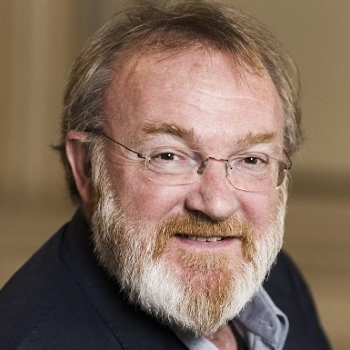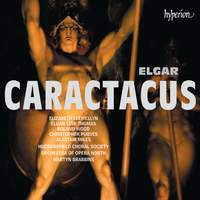Recording of the Week,
Martyn Brabbins conducts Elgar's Caractacus
Composed soon after works such as The Light of Life, King Olaf, and The Banner of Saint George, Elgar’s cantata Caractacus, commissioned for the 1898 Leeds Festival, comes from a particularly fertile choral period, and yet recordings of it (and indeed of all of the above pieces) are relatively uncommon. A fine new recording from Martyn Brabbins, the Huddersfield Choral Society, and the Orchestra of Opera North helps enormously to address this shortage.
 The plot concerns the first-century British chieftain and his ultimately unsuccessful attempts to repel the Roman invaders; he is then captured and taken back to Rome, where the baying crowds call for him to be put to death. However, his impassioned speech to the Senate so impresses Emperor Claudius that he and his family are pardoned and allowed to live freely in Rome.
The plot concerns the first-century British chieftain and his ultimately unsuccessful attempts to repel the Roman invaders; he is then captured and taken back to Rome, where the baying crowds call for him to be put to death. However, his impassioned speech to the Senate so impresses Emperor Claudius that he and his family are pardoned and allowed to live freely in Rome.
As he had done for portions of the text for King Olaf, for the libretto Elgar turned towards his friend and neighbour, Henry Arbuthnot Acworth. A criticism often made is that the quality of the words falls far short of that of the music; this is perhaps most true of the final chorus (“The clang of arms is over”), a jubilant paean to the noble might of the British Empire. Although some of it may strike modern ears as uncomfortably outdated (“The nations all shall stand and hymn the praise of Britain, like brothers, hand in hand” etc.), it certainly provided Elgar with ideal fodder for a good tune (“For all the world shall learn it, though long the task shall be”), and the performance of the Huddersfield Choral Society here is pleasingly full-bodied and resounding.
Perhaps the best-known section is the Processional Music from the start of Scene Six (sometimes performed purely orchestrally as the Triumphal March). The Opera North orchestra are given a chance to shine here, especially with dynamic percussion and great presence in the lower brass. Despite this procession and the rousing final chorus, the majority of the score is actually much more pastoral in tone, not least the atmospheric introduction to Scene Two, set in a sacred oak grove, with a stirring contribution from Christopher Purves as the Arch-Druid.
Some of the most charming music comes from Scene Three (introduced by a breezily graceful introduction, again often performed separately as the Woodland Interlude). The Opera North strings here are light and elegant, with delicate clarinet lines weaving affably in and out of the texture. This is matched by the subsequent chorus entry, who are delightfully gentle and airy whilst singing of “Priestly crowns of crimson hue, Opening roses bright with dew”. Moreover, soprano Elizabeth Llewellyn in the role of Caractacus's daughter, Eigen, is sublime as she waits for the arrival of her lover, Orbin (sung with ardent gusto by tenor Elgan Llŷr Thomas); their love duet is for me one of the highlights. Martyn Brabbins helps enormously here, making sure to maintain a flowing tempo but without ever pushing or sounding too hurried.
There are also impressive turns from Roland Wood as the eponymous chieftain, and Alastair Miles in the smaller but no less affecting role of the merciful Claudius. Although some may argue that this piece does not attain the compositional heights that Elgar was to achieve just two years later with The Dream of Gerontius, I think there are many splendid moments, and this exemplary recording makes a highly convincing case for this under-performed work.
Elizabeth Llewellyn (Eigen), Elgan Llŷr Thomas (Orbin), Roland Wood (Caractacus), Christopher Purves (Arch-Druid, A Bard) & Alastair Miles (Claudius), Huddersfield Choral Society, Orchestra of Opera North, Martyn Brabbins
Available Formats: CD, MP3, FLAC, Hi-Res FLAC



